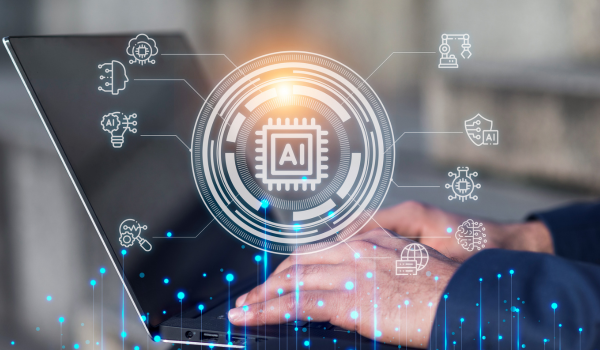To drive progressive changes and stay ahead of competitors, you must hire an AI engineer who is prepared to adapt and maintain visibility. Before that, you’ll need a clear understanding of what AI is capable of doing for you.
For starters, it is no longer bound to the concepts of innovation and automation. That much is clear with how it’s taking over various industries. It goes beyond the basics by having an intense impact on productivity. All it takes for you to reap the benefits of AI is to automate repetitive tasks. In return, it frees up your employees so you can have them focus on the project structure, which ultimately results in increased output and cost savings.
But what does that have to do with AI engineering? And how can an AI engineer help you reap those benefits? Let’s take a look at it!
What Is AI Engineering?
AI Engineering is the essential link between theoretical concepts in artificial intelligence and their tangible applications in the real world. It goes beyond the theoretical realm, transforming cutting-edge algorithms into robust systems that effectively address specific problems. This field represents a fusion of expertise, drawing from software engineering, data science, machine learning, and domain-specific knowledge.
AI engineers skillfully navigate the intricate landscape of algorithms, system architecture, and data interpretation, employing a comprehensive approach to their work. Instead of solely concentrating on designing algorithms, they emphasize the entire lifecycle of AI systems.
The discipline extends beyond conceptual considerations to address practical challenges encountered in real-time applications. AI engineers tackle issues such as scalability, efficiency, security, and ethical concerns, ensuring the functionality of AI systems in complex environments and products while also being mindful of potential biases and unintended consequences.
Therefore, there is a need for you to hire an AI engineer! as they are the driving force for automation across various industries. From streamlining manufacturing processes to improving medical diagnoses through data analysis, AI engineers continuously explore the potential of AI in diverse applications. Their skills and focus on practical deployment solve complex problems and propel innovation across different sectors.
What Does An AI Engineer Do?
Now that you understand what AI engineering is and how an AI engineer factors into it, let’s look at the role of an AI engineer. Here are some of the key aspects that capture the essence of why there is always a need to hire an AI engineer and what they do:
- Designing and Building AI Systems
AI engineers go beyond conceptualization. They translate ideas into reality by designing and constructing computational systems, algorithms, and infrastructure that power AI applications. This involves selecting appropriate algorithms, building data pipelines, and optimizing models through training processes.
- Data Wrangling and Processing
AI engineers acknowledge that data is part of AI, so they dedicate significant effort to acquiring, cleaning, and preparing data. They ensure data quality, relevance, and representation of the problem at hand, laying the foundation for effective AI solutions.
- Experimentation and Optimization
AI engineers engage in iterative processes, experimenting with diverse algorithms, hyperparameters, and model architectures. This constant refinement aims to improve performance and accuracy, guided by data analysis and evaluation metrics.
- Deployment and Monitoring
Once an AI model is trained, engineers take on the responsibility of deploying it effectively. This involves integration into existing systems, infrastructure management, and ongoing performance monitoring.
- Collaboration and Communication
Collaboration and team efforts are at the heart of AI engineering. Engineers work closely with every professional, including data scientists, software professionals, product managers, and other stakeholders, to understand problems, define requirements, and ensure AI solutions align with business needs.
- Keeping Up with the Pace
The dynamic nature of the AI field requires constant adaptation. AI engineers stay ahead of all market competitors by continuously learning about new technologies, frameworks, and algorithms. This commitment to ongoing learning ensures relevance and productivity.
- Ethical Considerations
AI engineers play a crucial role in the responsible development and deployment of AI solutions, addressing ethical concerns such as security bias, fairness, and applications. By using AI, they actively work toward reducing potential risks and ensuring ethical implications are properly addressed.
Roles and Responsibilities of AI Engineers
AI engineers have the power to impact the industry into their hands. They have major responsibility for the development and employment of the company, but that’s not where it ends. Here are some of the crucial roles and responsibilities performed by AI engineers:
- Model Architect and Builder
AI engineers serve as the architects and builders of the core components of AI solutions. Their expertise lies in the meticulous design and construction of computational models, encompassing the selection of algorithms, establishment of data pipelines, and the nuanced processes of training and optimizing models to achieve desired outcomes. Essentially, they are the visionary craftsmen turning theoretical concepts into tangible, functional systems.
- Data Mastermind
From the inception of an AI project to its execution, AI engineers take on the role of data masterminds. They navigate the complexities of raw data, undertaking the tasks of wrangling, cleaning, and formatting to prepare it for training. The management of data pipelines becomes a crucial responsibility, facilitating continuous learning and refinement as AI models evolve and adapt to changing requirements.
- Deployment Magician
The deployment phase marks the moment when theory meets practice, and AI engineers play the role of deployment magicians. They skillfully implemented real-world applications by integrating AI models seamlessly into existing systems. Their performance involves successful deployment and the smooth operation of these models in diverse real-life scenarios.
- Performance Detective
Constant vigilance characterizes the role of AI engineers as performance detectives. They configure the performance of AI models, analyze results, and identify areas for improvement. Proactively tuning and refining the models based on feedback and predictive data is a revolving process that ensures that AI solutions remain adaptive and responsive to their operational environments.
- Collaboration Champion
In the collaborative realm of AI engineering, professionals become champions of collaboration. AI engineers work closely with diverse professions, including data scientists, software engineers, product managers, and stakeholders. Their role is to comprehend the company, understand business needs, define requirements, and effectively communicate the value and impact of AI solutions.
AI Engineering Skills to Look for Before Hiring
AI engineers, marked as experts in the field of artificial intelligence, have profound knowledge of machine learning and computer programming. Hire an AI engineer who is a problem solver for any complex scenario, as their root foundation lies in statistics and mathematics resolving any business requirements.
- Mastery of Mathematical Foundations
When looking to hire an AI engineer, look for a person with an understanding of statistics, probability, and linear algebra. This person will play a crucial role in making strategic decisions related to algorithm selection, data analysis, and result interpretation; that’s why they need to be inept at mathematics.
- Command of Programming Skills
Programming skills are a fundamental requirement in the toolkit of an AI engineer. Proficiency in programming languages such as Python, R, and Java is a complete solution for any algorithm and for working with data. Additionally, a robust command of specialized libraries and frameworks like TensorFlow, PyTorch, and sci-kit-learn is essential for streamlined and effective development.
- Cultivation of Analytical Skills
AI engineers excel in computer applications and have complete authority over unrefined data. Their analytical skills allow them to dissect complex data, discern patterns, and extract meaningful insights. This skill set extends to problem-solving, enabling engineers to debug models, troubleshoot issues, and optimize performance.
- Effective Communication Skills
Beyond technical expertise, your AI engineer must have the skill to shine successfully in communication and collaboration. They must contribute to teams with diverse backgrounds and can articulate complex concepts in clear, concise terms.
- Bridging Technical Expertise with Business Perception
The creative mindset of an AI engineer’s expertise is the ability to align technical skills with business perception. Understanding the business context is imperative for developing AI solutions that meet real-life needs and generate tangible value. AI engineers prioritize initiatives, take account of their work, and ensure that their technical contributions align with overarching business goals.
- Embracing Adaptability and Continuous Learning
An exceptional quality that sets AI engineers apart is their commitment to adaptability and continuous learning. Given the rapid evolution of AI, successful engineers embrace a mindset of continuously adopting, progressing, and staying ahead of new technologies. They also stay updated on the latest algorithms and best practices.
How To Hire AI Engineers?
Start by clearly identifying your requirements and effectively target the appropriate candidate. Identify the specific goals of your AI project – whether it involves solving intricate problems, implementing algorithms, or focusing on domain-specific expertise.
Also, consider the experience and seniority required for the role. Make sure that you determine if a seasoned leader or a skilled developer aligns with your project’s needs. When necessary, look beyond technical skills and assess their soft skills such as communication, collaboration, and business acumen to ensure successful integration within your team.
Employ efficient recruitment strategies and assessment methods as needed. These methods are supposed to specifically target AI communities that attend relevant conferences and professional networks to reach qualified candidates. Craft detailed job descriptions that specify your company culture, project goals, and the significant impact an AI engineer can make.
Include screening and assessment tools such as coding challenges, technical interviews, case studies, and candidate assessment software to effectively evaluate the needed skill. This comprehensive approach to defining your hiring needs lays the foundation for attracting AI professionals.
5 Critical Artificial Intelligence (AI) Engineer Interview Questions
Question 1: Explain the Different Algorithms Used for Hyperparameter Optimization.
This question is crucial when interviewing an AI engineer. It investigates their understanding and ability to use different hyperparameter optimization techniques. These algorithms are essential for improving the performance of machine learning models. By asking this question, you can evaluate the engineer’s knowledge of machine learning and their ability to choose appropriate optimization techniques.
Question 2: Explain the Logic Behind Targeted Marketing. How Can Machine Learning Help With This?
This is an important question to ask an AI engineer. It gauges their ability to apply AI and machine learning principles to real-world business problems. The AI engineer’s response will reveal their understanding of how to harness machine learning algorithms to analyze vast datasets and derive consumer insights.
Question 3: How Can AI Be Used in Detecting Fraud?
Asking an AI engineer about the role of AI in fraud detection tests their ability to apply AI principles and technologies to practical, real-world situations. It provides an opportunity to gauge the engineer’s expertise in dealing with security challenges and their understanding of the ethical and privacy considerations.
Question 4: A Bank Manager Receives a Data Set Containing 1000s of the Records of Applicants for a Loan. How Can AI Help the Manager Understand Which Loans He Can Approve? Explain.
This question will demonstrate their capacity to apply AI to improve operational efficiency and make data-driven decisions. This question also probes their comprehension of the ethical considerations associated with AI decision-making, particularly in sensitive areas like loan approval.
Question 5: You’ve Won a 2-Million-Dollar Worth Lottery.” We All Get Such Spam Messages. How Can AI Be Used to Detect and Filter Out Such Spam Messages?
This question explores their capability to implement AI-based solutions to filter out spam and irrelevant content. Understanding how to implement such systems demonstrates an AI engineer’s ability to mitigate common digital annoyances and potential security threats.
How to Hire The Best AI Engineer With a Distant Job
To hire an exceptional AI engineer, a strategic approach requirement is needed. Creating a detailed job description that outlines the technical skills for this specific role is necessary. However, the job market is challenging, making the search and hiring process complex.
Thankfully, DistantJob is here to help! This agency is truly exceptional with its clearly defined solid foundation for a successful hiring process. DistantJob offers AI-powered skills assessments that evaluate candidates’ technical knowledge and problem-solving abilities in a practical setting.
The platform also helps you conduct thorough reference checks to verify a candidate’s past performance and work ethic. It can help you prioritize building a diverse AI team with varied backgrounds and perspectives. So, what are you waiting for?

Dawood is a digital marketing pro and AI/ML enthusiast. His blogs on Folio3 AI are a blend of marketing and tech brilliance. Dawood’s knack for making AI engaging for users sets his content apart, offering a unique and insightful take on the dynamic intersection of marketing and cutting-edge technology.










